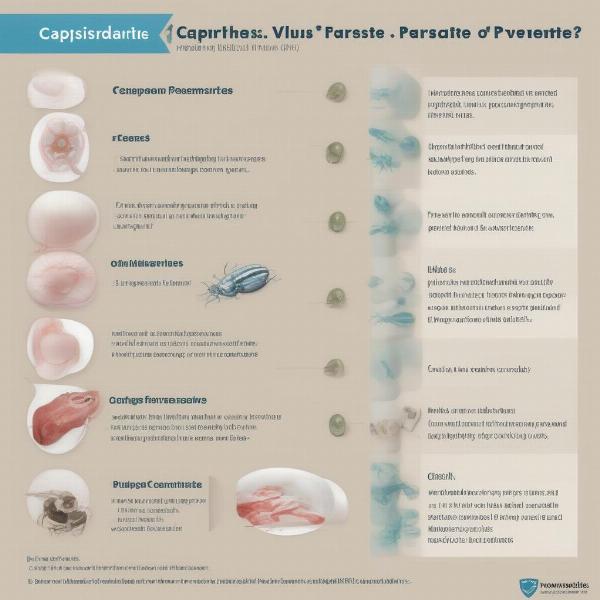Capshield Plus for dogs is a popular broad-spectrum parasite preventative known for its effectiveness against fleas, ticks, heartworms, and intestinal worms. Understanding its uses, benefits, and potential side effects is crucial for responsible pet ownership. This guide provides a detailed overview of Capshield Plus, helping you make informed decisions about your dog’s parasitic protection.
Understanding Capshield Plus: What It Is and How It Works
Capshield Plus combines two active ingredients: nitenpyram and lufenuron. Nitenpyram works by affecting the nervous system of fleas, leading to paralysis and death. Lufenuron, on the other hand, prevents flea eggs from hatching, disrupting the flea life cycle. This dual-action approach makes Capshield Plus effective in controlling existing flea infestations and preventing future ones. Additionally, it protects against heartworms and various intestinal worms. Choosing the right parasite preventative is vital for your dog’s health, and understanding how Capshield Plus works is the first step towards making the best choice for your furry friend.
Benefits of Using Capshield Plus for Your Dog
Capshield Plus offers several advantages in protecting your dog from parasites. Its broad-spectrum protection covers a wide range of parasites, offering comprehensive defense. The quick-acting nitenpyram kills adult fleas rapidly, providing relief for your itchy dog. Furthermore, by preventing flea eggs from hatching, Capshield Plus breaks the flea life cycle, preventing re-infestation. Its effectiveness against heartworms, a potentially fatal parasite, is a significant benefit. Finally, the oral administration makes it easy to give to most dogs.
Potential Side Effects and Precautions
While generally safe, Capshield Plus can have potential side effects in some dogs. These can include temporary skin reactions at the application site, such as redness or hair loss. Some dogs might experience gastrointestinal upset, like vomiting or diarrhea. In rare cases, more severe reactions like tremors or seizures have been reported. Always consult your veterinarian before starting your dog on Capshield Plus, especially if your dog has underlying health conditions, is pregnant, or nursing.
Dosage and Administration of Capshield Plus
Capshield Plus is available in various dosages based on your dog’s weight. It’s crucial to administer the correct dosage as prescribed by your veterinarian. Overdosing can lead to serious health problems. Always follow your veterinarian’s instructions carefully and never exceed the recommended dosage. If you miss a dose, consult your vet for guidance on how to proceed. Accurate dosing is key to ensuring your dog’s safety and the effectiveness of the medication.
Comparing Capshield Plus with Other Parasite Preventatives
Several other parasite preventatives are available on the market, each with its own advantages and disadvantages. Some popular alternatives include products like Frontline Plus, NexGard, and Heartgard Plus. While Capshield Plus offers broad-spectrum protection, other products may be more suitable for specific parasite concerns or individual dog sensitivities. Comparing different options can help you choose the most appropriate preventative for your dog’s needs. Factors to consider include the spectrum of parasite coverage, administration method, cost, and potential side effects.
 Comparing Parasite Preventatives
Comparing Parasite Preventatives
When to Consult Your Veterinarian
If you notice any unusual symptoms in your dog after administering Capshield Plus, contact your veterinarian immediately. Signs to watch out for include excessive itching, vomiting, diarrhea, lethargy, loss of appetite, or any neurological symptoms like tremors or seizures. Your veterinarian can determine if the symptoms are related to the medication and advise on appropriate action.
Conclusion
Capshield Plus can be an effective tool in protecting your dog from a range of internal and external parasites. However, responsible pet ownership requires understanding the product’s benefits, potential risks, and proper administration. Always consult with your veterinarian before starting your dog on any new medication, including Capshield Plus. Regular veterinary checkups and parasite prevention are crucial for maintaining your dog’s health and well-being.
FAQ
- How often should I give my dog Capshield Plus? Capshield Plus is typically given monthly.
- Is Capshield Plus safe for puppies? Consult your veterinarian to determine the appropriate age and dosage for puppies.
- What should I do if my dog vomits after taking Capshield Plus? Contact your veterinarian for advice.
- Can Capshield Plus be used with other medications? Discuss all medications your dog is taking with your vet before starting Capshield Plus.
- Where can I purchase Capshield Plus? Capshield Plus is available from your veterinarian or through authorized online retailers.
- What are the signs of a flea infestation? Common signs include excessive scratching, biting at the skin, and visible fleas or flea dirt (small black specks).
- How can I prevent heartworm disease in my dog? Regular administration of a heartworm preventative like Capshield Plus is the most effective method.
ILM Dog is your trusted partner in canine care and welfare, offering expert guidance on all aspects of dog ownership, from breed selection and health management to training, nutrition, and grooming. We are committed to providing accurate and practical information to dog owners worldwide. For personalized advice and support, contact our team of experienced dog professionals. Email: [email protected]. Phone: +44 20-3965-8624. Visit ILM Dog for more valuable resources and expert insights.